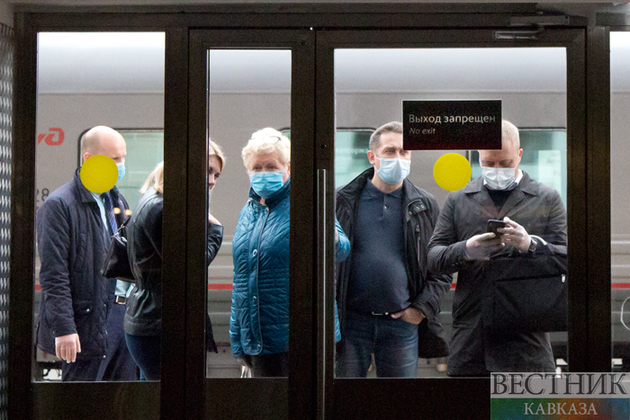Fears mount over the newly identified coronavirus variant Omicron - the new mutation, which is potentially more transmissible, was first discovered in South Africa and has since been detected in Australia, United Kingdom, Germany, Israel, Italy, the Czech Republic and Hong Kong.
CNN reports that Israel is banning all foreigners from entering the country in response to Omicron fears, authorities announced Saturday. The ban, pending government approval, is expected to last two weeks. Israelis returning from a country on the red list, which includes countries in southern Africa, will be required to isolate for seven days in a designated hotel. There are seven suspected cases of the variant in Israel, in addition to one confirmed case.
Two Omicron cases have been detected in Australia after travelers from southern Africa arrived in Sydney, the New South Wales Health Ministry said Sunday. The two travelers are in isolation along with 12 other passengers who came from southern Africa. Both cases are people who are fully vaccinated and asymptomatic.Australia has banned the entry of foreigners who have traveled to nine southern African countries in the past 14 days, including South Africa, Lesotho, Botswana, and Zimbabwe.
South Korea has imposed restrictions on travelers from eight southern African countries, its Disease Control and Prevention Agency announced Saturday. Foreign nationals traveling from South Africa, Botswana, Namibia, Zimbabwe, Lesotho, Eswatini, Malawi and Mozambique are banned from entering South Korea. The issuing of visas for nationals from those countries has been suspended until further notice, Agency added. Korean nationals entering from those countries must quarantine in a government-designated facility for 10 days.
Europe is also frantically imposing travel bans and scrambling to ramp up its coronavirus sequencing abilities after several countries on the continent reported suspected Omicron cases. A suspected case of the variant was discovered in Innsbruck, western Austria, after a traveler who recently arrived from South Africa tested positive for Covid-19, the Tyrol state government said Saturday. Samples from the case have been sent to the capital of Vienna, and results are expected in the coming days.
Scientists at the Regional Hospital in Liberec, Czech Republic, reported that one case of the Omicron variant was detected in a traveler who arrived from Namibia. Eight other people that traveled with the infected person are also being checked for Covid-19 and the variant.
By Saturday afternoon, two cases were confirmed in the UK, two others in Germany and one in Italy. Dozens more are suspected in the Netherlands and the Czech Republic.
The director of the National Institutes of Allergy and Infectious Diseases in the United States, Dr. Anthony Fauci, also said it was possible the new variant was already in his country but was yet to be detected.
UK's Secretary of State for Health Sajid Javid said the two cases detected in the UK were linked to travel to southern Africa. "These individuals are self-isolating with their households while further testing and contact tracing is underway," he added.
The discovery of the new variant has sparked fears around the world. A number of countries have imposed travel bans and the global markets plunged. But while WHO designated the Omicron a "variant of concern" on Friday, it stressed that more research is needed to determine whether the variant is more contagious, whether it causes more severe disease, and whether it could evade vaccines.
"This variant has a large number of mutations and some of these mutations have some worrying characteristics," Maria Van Kerkhove, WHO's technical lead for Covid-19, said in a statement on Friday. "Right now there are many studies that are underway ... so far there's little information but those studies are underway so we need researchers to have the time to carry those out and WHO will inform the public and our partners and our member states as soon as we have more information".
Lawrence Young, a virologist and a professor of molecular oncology at Warwick Medical School in the United Kingdom, said the Omicron variant was "very worrying": "It is the most heavily mutated version of the virus we have seen to date. This variant carries some changes we've seen previously in other variants but never all together in one virus. It also has novel mutations".
The variant has a high number of mutations, about 50 overall. Crucially, South African genomic scientists said Thursday more than 30 of the mutations were found in the spike protein -- the structure the virus uses to get into the cells they attack. Scientists have praised South African health authorities for their quick reaction to a Covid-19 outbreak in the country's Gauteng province, which led to the discovery of the new variant. When cases in the province started to rise at a higher rate than elsewhere, health experts focused on sequencing samples from those who tested positive, which allowed them to quickly identify the B.1.1.529 variant.
Sharon Peacock, a professor of Public Health and Microbiology at the University of Cambridge, said the South African Health Ministry and its scientists "are to be applauded in their response, their science, and in sounding the alarm to the world". She added the development shows how important it is to have excellent sequencing capabilities and to share expertise with others. That message was reinforced by WHO, which has on Friday called on countries to enhance their surveillance and sequencing efforts to better understand coronavirus variants.






